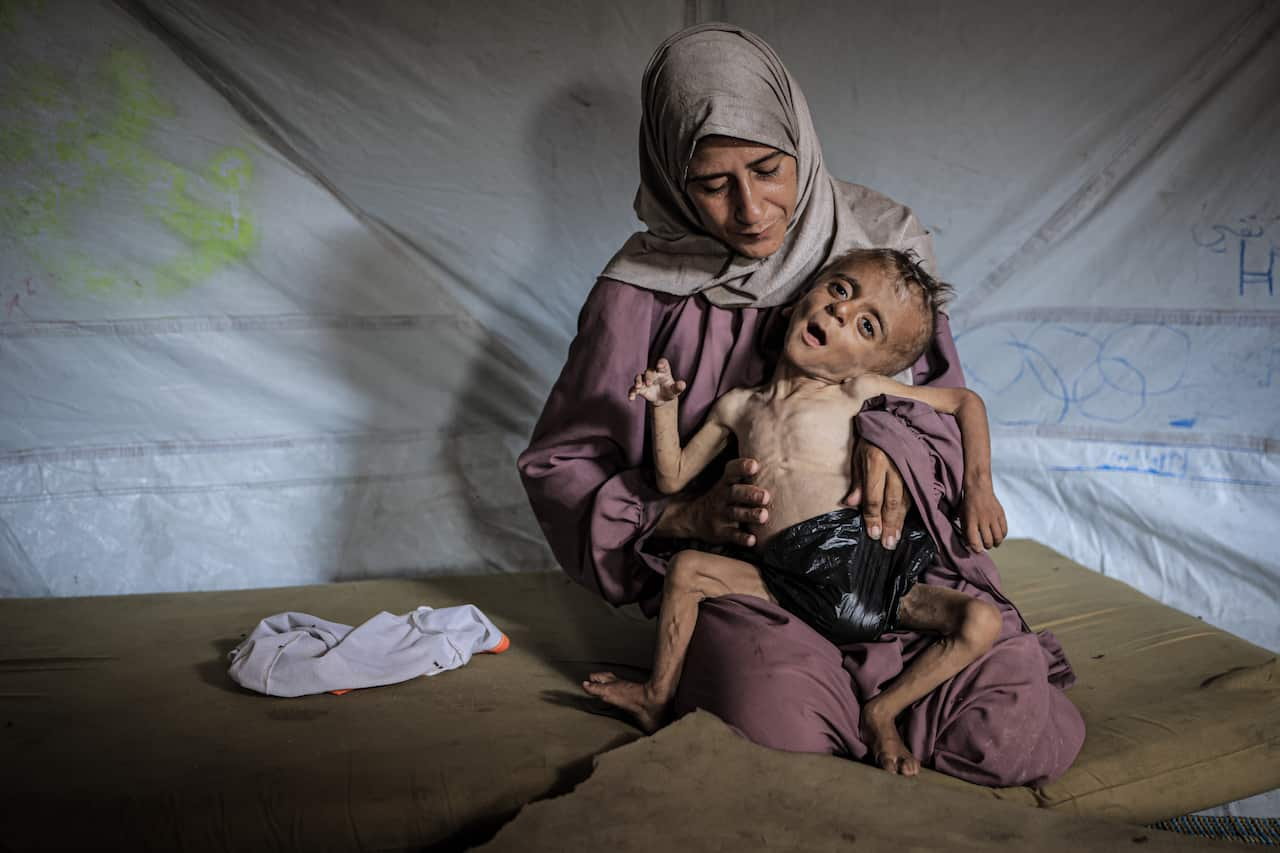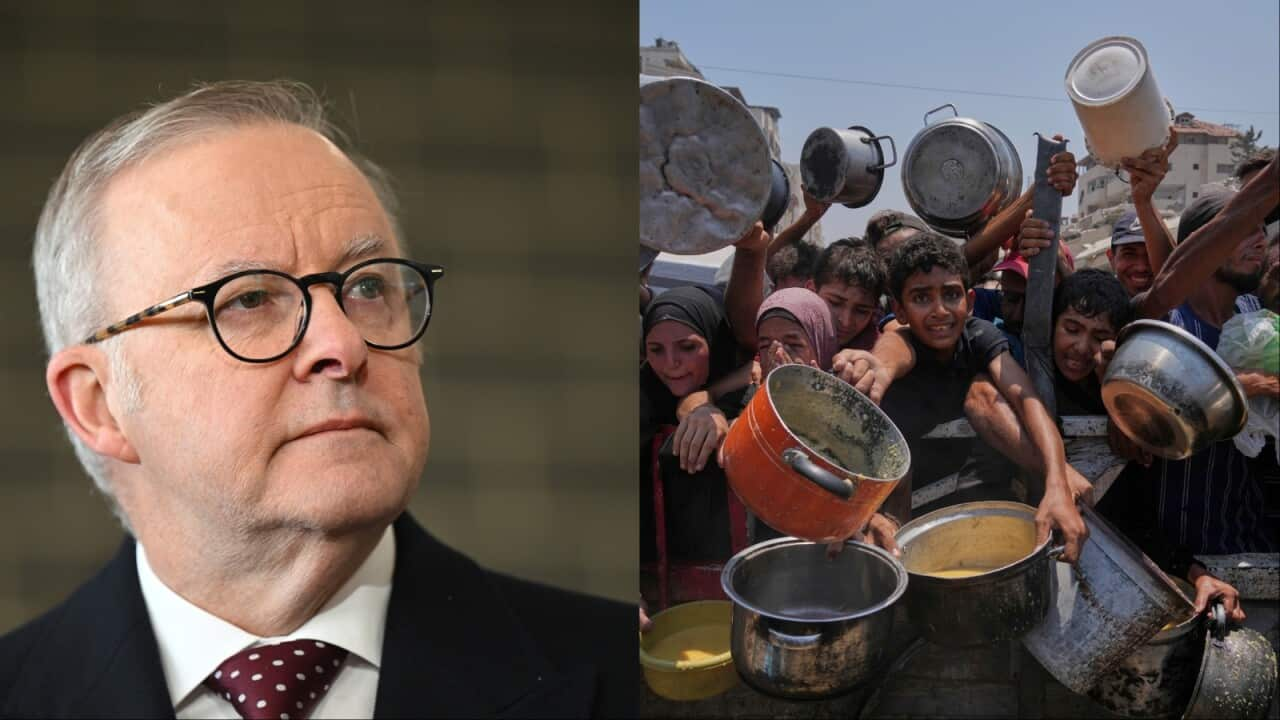Key Points
- Anthony Albanese says it was a breach of international law to "stop food being delivered" which he said was an Israeli decision.
- The prime minister said a decision would be made at an "appropriate time" on recognising a Palestinian state.
- Israel has allowed some aid to flow into Gaza as an estimated 2 million people face mass hunger.
Prime Minister Anthony Albanese says Israel is "quite clearly" breaching international law by limiting aid deliveries into the besieged Gaza Strip.
But he said Australia would not follow the likes of France and recognise a Palestinian state at an upcoming United Nations conference.
In one of his strongest statements yet on the issue, Albanese said scenes of starvation in Gaza "break your heart", singling out a picture of an emaciated one year old boy, Muhammad Zakariya Ayyoub al-Matouq, that was widely published around the world last week.

He said civilian casualties and death in Gaza were "completely unacceptable" and "completely indefensible".
"Quite clearly, it is a breach of international law to stop food being delivered which was a decision that Israel made in March," he told the ABC's Insiders program on Sunday.
"I'm not a lawyer, those things will play out their course, but I tell you what it's a breach of — it's a breach of decent humanity and of morality and everyone can see that.
"I'm a supporter of Israel and Israel's right to defend itself, but that boy isn't challenging Israel's right to existence, and nor are the many who continue to suffer from the unavailability of food and water."
Albanese said that Hamas was holding not just Israelis hostage but also Palestinians, and added that international law states innocent people should not be held responsible for the actions of Hamas.
"Israel as a democratic state has a responsibility to ensure that innocent lives are not lost, and we have seen too many Israeli and Palestinian lives lost."
Australia won't yet recognise a Palestinian state
The prime minister moved on to discuss how the war could come to an end, citing his support for a two-state solution.
When asked about whether his support for a two-state solution extends to recognising a Palestinian state, Albanese said a decision would be made at an "appropriate time".
"What we will do is we'll make a decision based upon the time. Is the time right now? Are we about to imminently do that? No, we are not."
The prime minister listed his concerns about recognition, questioning how it would reduce Hamas' involvement in a Palestinian state and how such a state could exist and not threaten Israel's sovereignty.
"We won't do any decision as a gesture. We will do it as a way forward if the circumstances are met," he said.
On Thursday, France announced it would formally recognise the state of Palestine at the UN General Assembly on September 21, drawing criticism from the US and Israel.
Albanese said Australia is prepared to play a "constructive role" but has minimal influence as a "middle power" in global politics.
He flagged that the United States would have a "critical role" to play as it has been an intermediary during the ongoing conflict in the Middle East.
Air drops of aid to resume
International aid organisations say mass hunger has now arrived among Gaza's 2.2 million people, with stocks running out after Israel cut off all supplies to the territory in March, then reopened it in May but with different restrictions.
Israel said it resumed aid airdrops to Gaza on Saturday and was taking several other steps to ease the humanitarian crisis in the Palestinian enclave, amid mounting international pressure and warnings from relief agencies of starvation spreading there.
The Israeli military said "humanitarian corridors" would be established for the safe movement of United Nations convoys delivering aid to Gazans and that "humanitarian pauses" would be implemented in densely populated areas.
Albanese described Israel's allowance of aid airdrops and convoys as a "start" but that the civilian casualties in Gaza are "completely indefensible".
On Wednesday, it was reported 15 people, including a six-week-old baby, starved to death in 24 hours in Gaza, according to doctors, linking this to a wave of hunger that persisted for months.
— Additional reporting by the Reuters News Agency
UPDATE: The original version of this story included images supplied by Getty Images/Anadolu of Mohammed Zakariya Eyup Al-Matouq amid reports of spreading starvation in Gaza. His mother and treating doctor have confirmed via Anadolu that he had a pre-existing health condition, and is experiencing both severe malnutrition and a muscle-related illness. Read the full story here.
For the latest from SBS News, download our app and subscribe to our newsletter.

